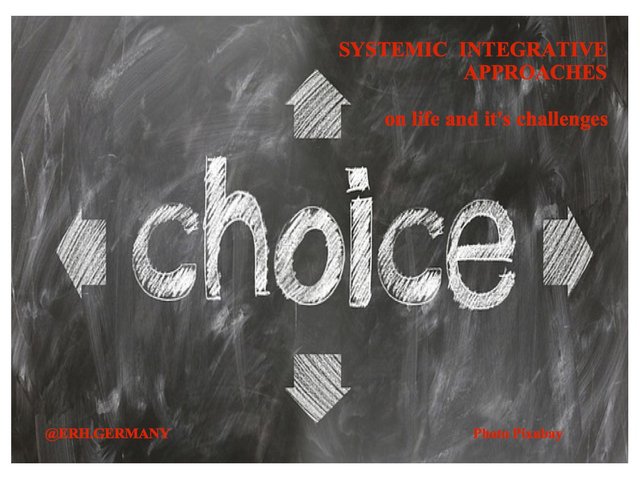WHAT'S A TETRALEMMA and what is it good for?
We live in a world of duality.
How often do you come across "either, or" statements like: "if you are not for me, you are against me".
Can you still count the arguments where it was said: "Now make up your mind. Are you pro or contra weapons possession?"
This form of debate leaves no room for a deeper discussion of an issue. It is accompanied by the feelings of the participants and if you examine it, you realize that it wasn't so much about the matter as about the relationship between the participants of a discussion round.
In the search for agreement - because that is the aim of any debate (or should at least be) - it comes as a surprise that one has eluded. It may also play a role that the interlocutors are accustomed to being either winners or losers and therefore everyone tends to win a debate if possible. Of course, only the one who recognises an insight from the other or, at worst, if his counterpart has no more arguments and flees into distractions or in it to react emotionally about, considers himself the winner.
It should be said that no one can be completely free from their own feelings of impatience, irrationality, insecurity or anger. The chances of someone or something pressing unconscious trigger points on a debate or a person are good. To believe that you always argue for the sake of one thing and practice objectivity is a common misconception. On the surface of his appearance, someone may be calm, argue on the basis of facts, but within himself the demons are romping.
This is no longer dramatic, but it's good to know when the next time you want to shoot the other person on the moon.
I started with this "two-position model" in order to find a transition to the actual method I am concerned with:
The subject of "Tetralemma"
We in the West are accustomed to dealing with the "dilemma" and it dominates our way of thinking to a very high degree.
I am in a dilemma when it comes to deciding: who should I help first as a doctor in an emergency situation? The one whose chances of survival are good or the other one who already seems to be ordained dead?But what is a tetralemma? In the context in which I write about it, it is a method of systemic structural constellation [1] [2] [3] . It not only incorporates two considerations in a thought, such as "shall I part with my husband or remain with him", but also opens up undiscovered possibilities for confrontation and decision making.
Here is a mathematical visualization of the tetralemma [4]:
The positions here are:
- Position 1: The One
- Position 2: The Other
Out of this dilemma should lead to the assumption of a position, which is called "both". - Position 3: Both.
So far so good, we know that. But now two more positions are added, namely:
- Position 4: None of both
- Position 5: Not all this and not even that.
I would like to illustrate this with a simple example - the cake problem:
- You can choose between strawberry and raspberry pie (1: one or the other).
- You like to eat both and therefore you order both cakes (2: both).
- If you don't want to choose one or the other, you can also choose chocolate cake (3: neither).
- But you can also say: Neither, nor. I don't want any cake at all, but ice cream (4 and 5).
The great garden of life
If one looks at an interpersonal problem, in which one is first of all of the opinion that one can only decide between certain positions, like looking at a landscape in which the passing of positions to the end is also a possibility, one realizes that one has to deal with a process that always starts from the beginning. Since nothing in this landscape remains static and always changes, it is logical that my view of the environment is also influenced by these changes.
If I have a marriage crisis and I am faced with the question: "Staying together or separating?, an event from outside can completely override this question. For example, when a family member falls seriously ill or dies. Within the events that follow, people do not necessarily behave in such a way that they coolly postpone their decision until the new situation has been mastered by them, but rather they reconsider or re-evaluate their own crisis situation. In this event space, the questioning spouse looks at the other one and may consider the separation to be nonsensical if the other one is empathetic to the death of a family member.
You never know, right?
As far as the questioning partner is open for a tetralemma analysis and does not insist on a "completely or not at all" position, this approach is recommendable.
Why don't we spin around a bit and deal with the marriage problem as well as the cake problem of just now. Separate or stay together? Neither one nor the other, but both! How can you do that?After all, I can't separate AND stay together?
But the question is interesting, isn't it? What if I only change something in the conditions, for example, I decide that I only want to separate spatially, but not in terms of relationships. This is now widely known as "time-out". We don't trust the thing, though.
What would the fourth position be, so neither one? I don't break up, nor do I stay with the other one. It would basically be the decision not to have to make a decision yet. So to wait and see how the landscape around me will change. This is a very reliable constant: change is guaranteed.
But to lash the knot in the head a bit tighter, one could actually say:
"I separate and I stay together with my husband at the same time". To this end, I open the room for what exactly I understand by this to say that I want to separate something in my relationship from the other and where I want to deepen the bond.
The fourth position would mean neither separation nor remaining together. I can completely remove the meaning of this decision and "cancel"it, so to speak. I can say: My premise is irrelevant and I raise another one into the state of meaning. For example, by suggesting a joint project to my husband, which I always wanted to put into practice. This may still be connected with the primordial idea that leaves the question of remaining together in the back of one's mind, but no longer focuses on it. It already includes position five. I could say that by working on a new project or hobby of my own, I am relieving myself of too much dependency on my husband, making the relationship easier for both of us. So far this represented a significant potential for conflict between him and me.
I could also say - knowing the Tetralemma method: "Because I know that events will come and go, which will be good and bad once and for all, I release myself from this decision.
I will no longer torment myself with it as if it were a question of "life" or "death".
Of course, all this is still too simple, but it is only intended to illustrate how much we are sometimes restricted in only two ways and to close ourselves off from other perspectives.
If I'm just torn back and forth in my decisions and steps, I miss the experience of how it can be when I walk around a thing, looking at it from the back, front, top and bottom[5]. But finally, of course, I should also make a decision.
From a systemic point of view, my decision should attract as many winners as possible. At least this should be my ideal or goal. And only when I realize that in some cases not everyone can win (even though I think that), am I prepared to accept that the real evil lies in avoiding pain and sorrow. Not all decisions are taken favourably by others, even after careful consideration. Because the other person simply cannot consider my decision to be win-win, even though I am convinced that it is. But after all, not the others live in my mind and body, but I am the author of my life story and want to move confidently in it.
Next time you see yourself caught between the "either, or" question, remember that there is also a "neither, nor" and not least a "what else?".
If you like, tell me your dilemma and I'll try to follow the process of constellations with you. It's actually better to integrate what your body tells you while processing and not only to use your brain resp. intellect.
Thank you for your attention!
[1]: Elisabeth Ferrari, Insa Sparrer, Matthias Varga von Kibed - Simply More Complex: A SySt® Approach to VUCA (Volatility, Uncertainty, Complexity and Ambiguity ) Link extern
[2]: Systemic Structural Constellations in Organisations
Henriette Katharina Lingg - Page 2 / PDF-document[3]: Overview of Systemic Constellations White paper - Francesco Pimpinelli Link extern
[4]: KPLEX Project - Knowledge Complexity: Link extern
[5]: Christoph Papst - Systemic Structural Constellation Consultant (SySt©) explains the process of a tetralemma on youtube
Various definitions of "tetralemma": http://www.wordnik.com/words/tetralemma
Since I find many relationships and similarities between the systemic approach and eastern philosophy and teaching, this link may also be interesting: https://studybuddhism.com/web/en/about/glossary/glossary_tibetan.html_80737387489c.html?letter=M
As a consultant I work with family systems and the related issues within a system - this includes singles and couples/separated couples & patchwork families.
Systemic counselling involves counselling people with regard to their respective social systems in the respective context. Among other things, it includes advice on the family context. Systemic consulting is based on system theory, e. g. Talcott Parsons, constructivism, e. g. Fritz B. Simon and second-order cybernetics, e. g. Heinz von Foerster, Cybernetics of Cybernetics, The Control of Control and the Communication of Communication
Picture sources:
* two doors: Photo by Luis Alfonso Orellana on Unsplash
* cake: Photo by Brooke Lark on Unsplash
* sign: Photo by Ben Rosett on Unsplash
* couple: Photo by Jean-Philippe Delberghe on Unsplash
Eve with the book of knowledge: pixabay
If this has met your taste and interest,
follow me: @erh.germany
Also you might want to read my other articles. They vary from entertainment to art.







good approach to explaining it !
I thank you.
Excellent post... I'm a typical "Libra", so decision making isn't my strong side. But after life gave me few good slaps in the face I'm getting better. Plus I learned the benefits of win/win and how to avoid making another person look stupid in an argument.. although I admit, that I can't always apply the knowledge beyond a certain point :-b
In reference to your last paragraph... I know quite a few people here by know, who post really good content. My voting power is constantly low, as it goes down with every upvote one makes. If I upvote with less then 100% I can show my appreciation to more posts, but I feel I'm not giving enough credit. Now... do I try to find that person on fb and give a like there... or on twitter (4 and 5)? Hm... 🤔
Congratulations @erh.germany! You have completed some achievement on Steemit and have been rewarded with new badge(s) :
Click on any badge to view your own Board of Honor on SteemitBoard.
For more information about SteemitBoard, click here
If you no longer want to receive notifications, reply to this comment with the word
STOPDuality includes aspects ownership which are like shades.